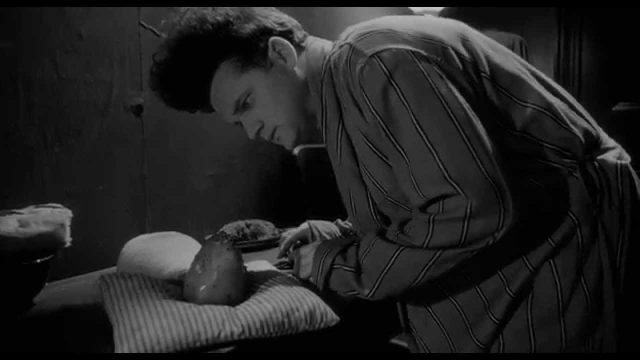If I had to blame any single reason for my desire to never have children, I’d blame Eraserhead. A friend once joked that David Cronenberg gives him a weird boner, but at least he understands where it comes from. On the other hand, David Lynch gives him an even weirder boner and it freaks him out because he doesn’t know why he has it. In a nutshell, this describes David Lynch’s subconscious machinations, all started here.
Eraserhead is a very male movie, but not a movie about machismo. It’s a deconstruction and reinforcement of male insecurities about fidelity and fatherhood. Henry Spencer (Jack Nance) just had a baby with his wife, Mary, except the baby is a crying screaming monster demanding food and attention with a high pitched wail of pain. Tired of this offspring, who might not even be human, Henry cheats on his wife with the woman next door, but ultimately has to face his offspring. Will he raise it well, or will he kill it? Aren’t all children just screaming monsters? Why is that Lady in the Radiator stomping on all his sperm?! And, why was his head sold to a pencil factory?
Far more than any of David Lynch’s films, Eraserhead feels like a Rorschach test of a horror movie. Any given viewer will pull different messages from the same movie, and, most likely, they could build a coherent argument about the deeper meanings of an arthouse B&W fixture. More than any deeper meaning, Eraserhead is just a plain old disturbing movie. Lynch is operating in a grainy, industrial, black and white reminiscent of Dali. The impeccable sound design keeps the audience on uneasy footing through music box themes and unnerving sound design. Erasherhead feels less like a traditional horror film and more like some bastard child of kitchen sink noir and Tetsuo: The Iron Man. All these years later, by appealing to our basest fears, Eraserhead still holds the power to change your view on family and adulthood.
Eraserhead streams on Hulu

